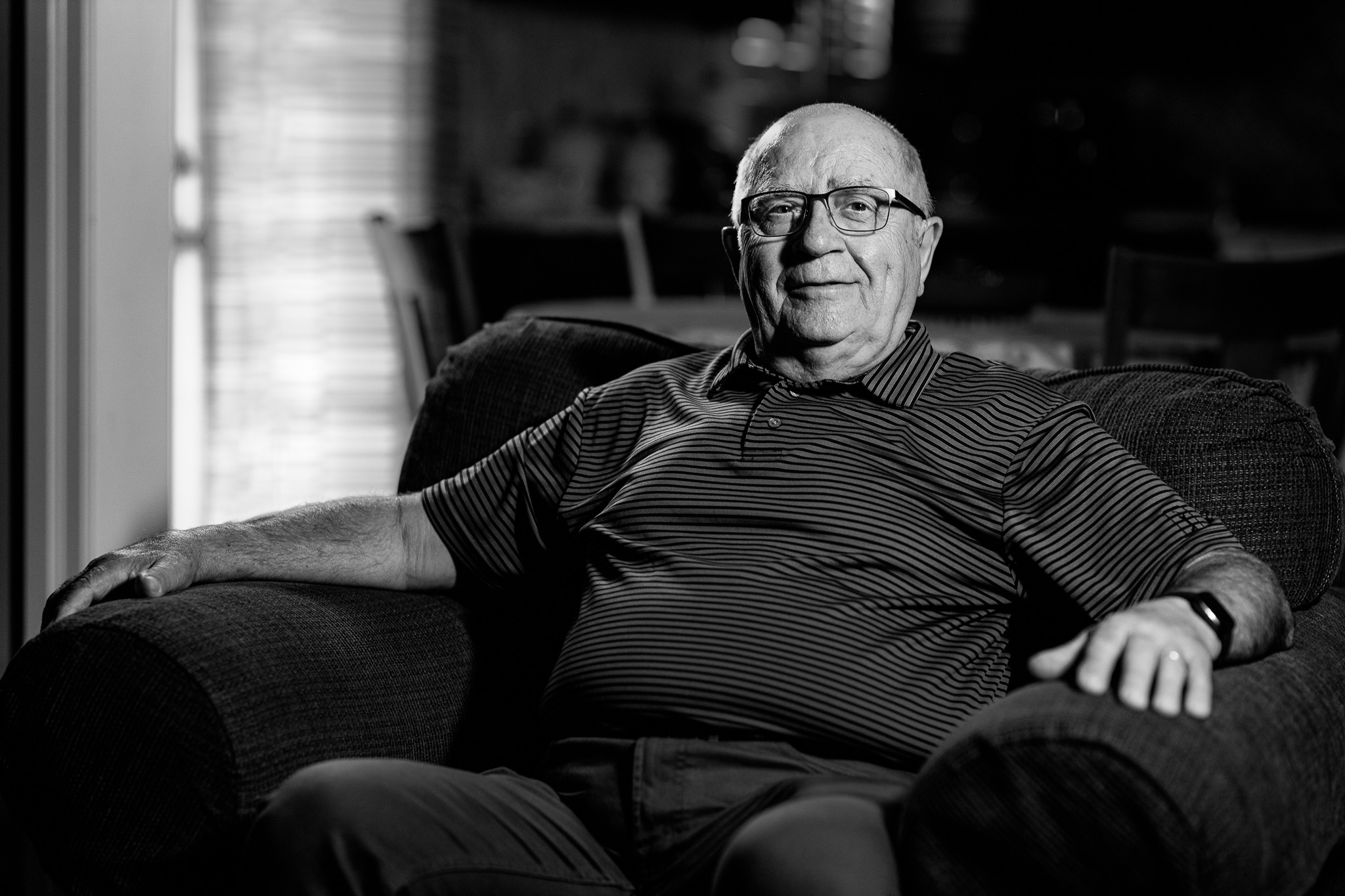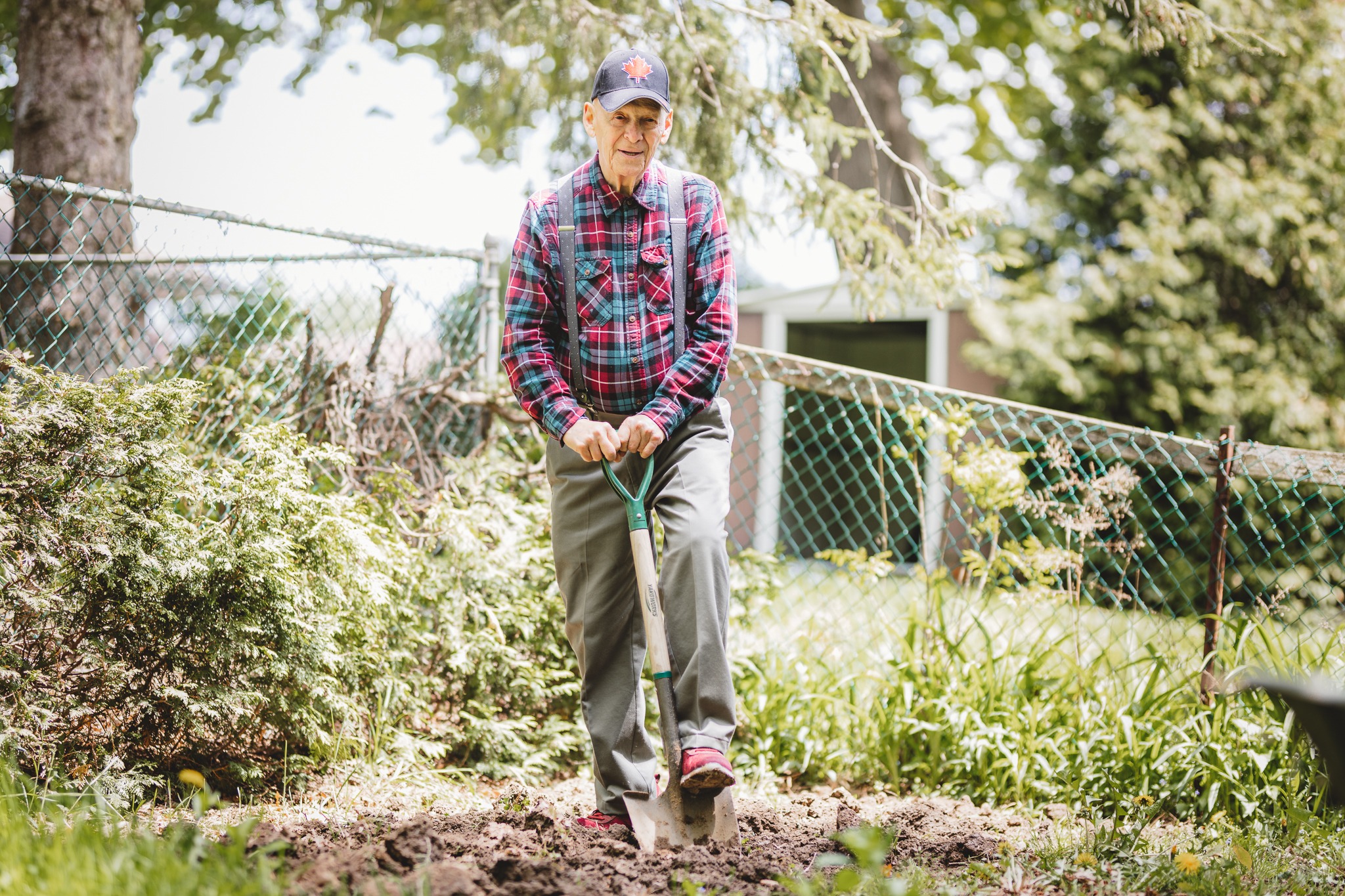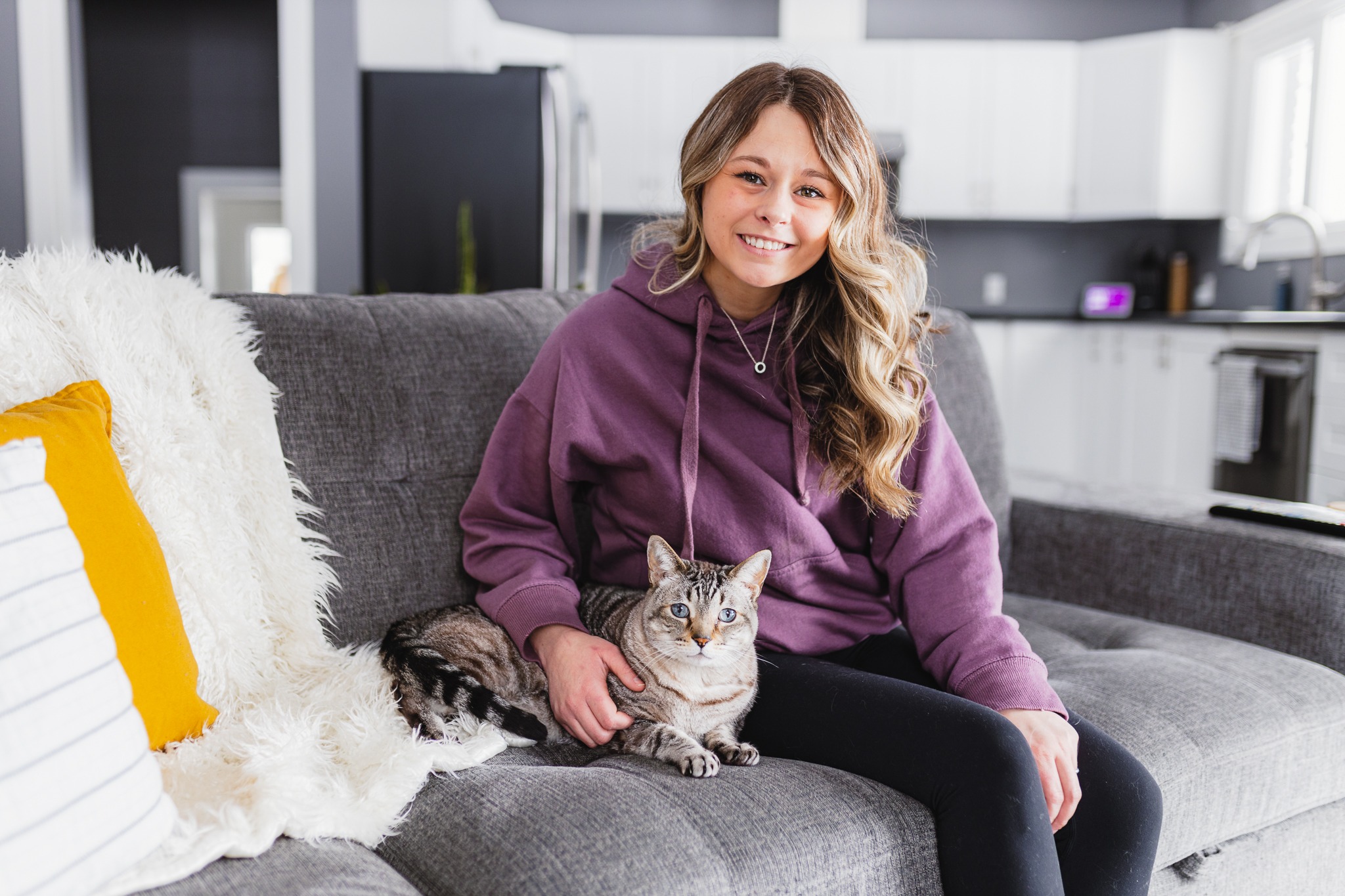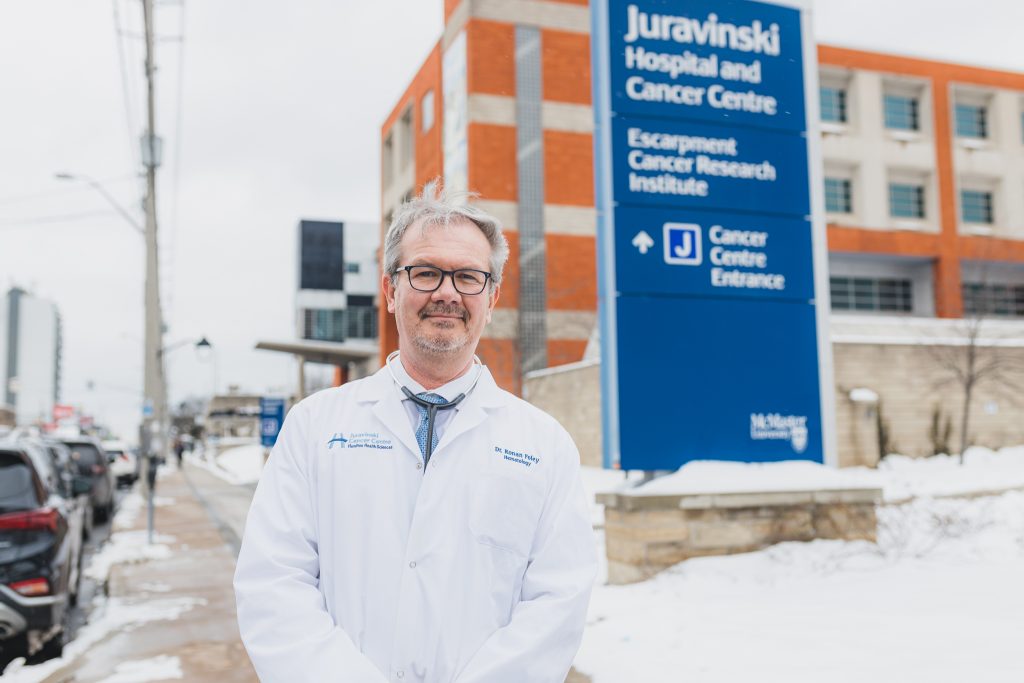
Patient’s white blood cells genetically changed into cancer killers
New treatment could bring long-lasting remission
Hamilton Health Sciences (HHS) cancer patient Blair Chown stayed close to home this winter. But a sample of his T-cells, a type of white blood cell, travelled south to a medical lab in sunny California, where they were genetically modified into millions of killer cells that will hunt down and destroy the cancer threatening his life.
Blair Chown will be the first HHS patient to receive CAR T-cell therapy with Tecartus, a new cancer-killing medication made from his genetically altered T-cells
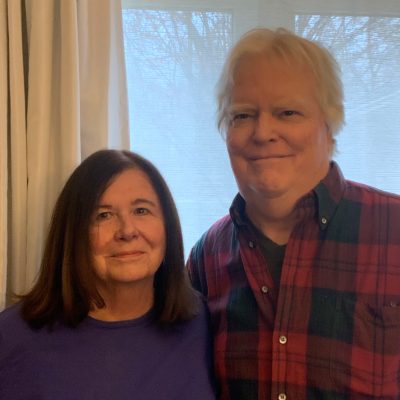
Patient Blair Chown, pictured here with his wife Linda, is sharing his cancer journey for 2023 World Cancer Day on Feb. 4.
“I was considered palliative, but thanks to this new treatment I have hope,” says Chown, 71, a one-time radio personality and retired millwright from the Leamington area who has mantle cell lymphoma. This aggressive type of non-Hodgkin’s lymphoma develops in the outer edge of a lymph node, called the mantle zone. About 8,000 people a year in Canada are diagnosed with non-Hodgkin’s lymphoma. Of those, only about 100 receive a mantle cell diagnosis. Chown is sharing his story for World Cancer Day on Feb. 4.
Immunotherapy: a new cancer-fighting weapon
“The war on cancer has traditionally been fought on three fronts: radiation, chemotherapy and surgery,” says Dr. Ronan Foley, Chown’s hematologist. “But now there’s a fourth front— immunotherapy—and it’s offering new hope to many cancer patients.”
“Without Tecartus, these patients would be considered palliative, facing end-of-life care.” — Dr. Ronan Foley, hematologist
Immunotherapy is a type of cancer treatment that helps a person’s own immune system fight cancer. CAR T-cell therapy is an immunotherapy that involves changing a patient’s T-cells in a laboratory so they’ll attack cancer cells. Chown will undergo CAR T-cell therapy this month at HHS’ Juravinski Hospital and Cancer Centre (JHCC) in Hamilton. JHCC is one of only three centres in the province approved to provide CAR T-cell therapy to adult patients.
New medication brings hope
The made-in-California medication containing Chown’s genetically-engineered cells is called Tecartus (brexucabtagene autoleucel).
Funding for Tecartus was approved for JHCC just a few weeks ago, and is bringing new hope to patients with certain cancers
Tecartus treats adults with aggressive B-cell non-Hodgkin’s lymphoma, which includes mantle cell lymphoma. Tectartus is different from other cancer medicines because it’s made from a patient’s own white blood cells, which have been modified to recognize and attack lymphoma cells, making complete and lasting remission possible. Since the T-cells persist in patients for many months, it’s often considered a ‘living drug.’
“It’s an honour to serve our patients, and incredibly rewarding to be able to offer them this hope.” — Dr. Ronan Foley, hematologist
Funding for Tecartus was approved for JHCC just a few weeks ago, and Chown will be the cancer centre’s first patient to receive CAR T-cell therapy with it.
JHCC has been providing CAR T-cell therapy since 2020 for other types of lymphoma, with 30 to 36 patients per year receiving treatment. Now, thanks to the addition of Tecartus, some additional types of lymphomas can be treated here, including mantle cell, bringing hope to more patients who are currently considered palliative.
Making killer cells
Chown’s T-cells were sent to the California medical lab in January. To make Tecartus, a special connector called a CAR (chimeric antigen receptor) was added to Chown’s T-cells, hence the name CAR T-cell therapy. This connector improves the T-cells’ ability to latch onto cancer cells and destroy them.
It takes about four weeks to transform T-cells in the lab and send them back to JHCC for Chown’s treatment. Chown is scheduled for his CAR T-cell therapy this month, which includes three days of low-dose chemotherapy to help prepare his body to accept the new, modified killer cells. On treatment day, he’ll receive an infusion that takes up to 30 minutes. In that time, millions of his own cancer-fighting CAR T-cells will be returned to his body to hunt down and kill cancer cells.
“I have tremendous confidence in the team there. They have been superb.” — Blair Chown, patient
“Once infused, CAR T-cells go on to multiply in the body and continue fighting the cancer,” says Foley. “It’s a one-and-done treatment, since patients typically need only one CAR T-cell infusion.”
Chown’s medical team will continue to monitor him carefully for weeks afterwards, since there are several possible side effects including fever, nausea and low blood pressure. Chown says he’s also grateful for his family’s support, including his wife Linda, and his daughter Melissa who has offered to take time away from work to help with monitoring.
Last line of defence
Tecartus CAR T-cell therapy is only considered when chemotherapy and/or a stem cell transplant failed to control the cancer. “Without Tecartus, these patients would be considered palliative, facing end-of-life care,” says Foley.
An American study of Tecartus is promising, with 87 per cent of patients showing a decrease in cancer and 62 per cent achieving complete remission
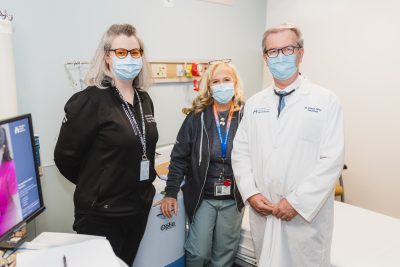
Registered nurses Lindsay Chalmers and Angela Ormerod, and Dr. Ronan Foley in the room where a sample of a patient’s T-cells are collected.
Chown’s mantle cell lymphoma was treated with chemotherapy and a stem cell transplant after his 2014 diagnosis, but his cancer came back.
Before Tecartus became an option, Chown was told that he had less than two years to live. But with this promising treatment, his cancer could be knocked into remission for good.
Bringing hope to end-of-life patients
An American study of Tecartus has shown very promising results, with 87 per cent of patients in the study showing a decrease in cancer and 62 per cent achieving complete remission.
“Thanks to this new treatment, I have hope,” says Chown, who, with his wife Linda, is a busy community volunteer. They raised three children as well as being foster parents to 50 children and teens over the years.
“I’m so grateful for this treatment, and the care I’ve received in Hamilton,” says Chown. “I have tremendous confidence in the team. They have been superb.”
JHCC is the only hospital in the region where patients can be treated for all forms of cancer, with its staff and doctors supporting more than 26,000 cancer patients each year.
“Bringing CAR T-cell therapy, and most recently Tecartus, to JHCC has been a team effort that allows us to treat even more patients,” says Foley. “It’s an honour to serve our patients, and incredibly rewarding to be able to offer them this hope.”

